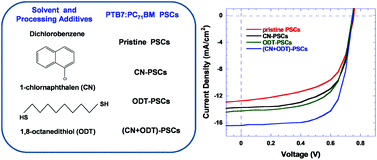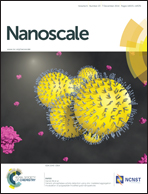The influence of binary processing additives on the performance of polymer solar cells†
Abstract
In this study, we report the investigation of the influence of binary processing additives, 1,8-octanedithiol (ODT) and 1-chloronaphthalene (CN) on the performance of polymer solar cells (PSCs). It was found that the power conversion efficiency (PCE) can be enhanced to 8.55% from the PSCs processed with binary processing additives as compared with ∼6.50% from the PSCs processed with either ODT or CN processing additives. With binary processing additives, the crystallinity of the electron donor polymer, poly[[4,8-bis[(2-ethylhexyl)oxy]benzo[1,2-b:4,5-b′]dithiophene-2,6-diyl][3-fluoro-2-[(2 ethylhexyl)carbonyl]thieno[3,4-b]thiophenediyl]], was elevated, which in turn facilitated charge transport within the bulk heterojunction (BHJ) layer, resulting in a high short-circuit current and large fill factor. By photophysical studies, we further found that the high PCE is majorly attributed to the minimized nongeminate recombination by controlling the kinetic film morphologies of the BHJ composite by binary solvent processing additives.


 Please wait while we load your content...
Please wait while we load your content...